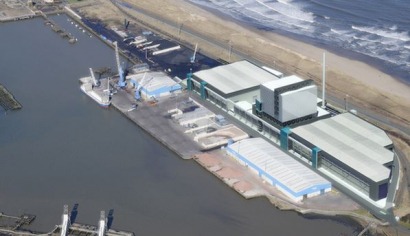
The company's decision follows the withdrawal of a key project partner in late 2013.
In a written statement, RES said, "The Government’s inconsistent support for dedicated biomass energy over the last two years - as well as increased uncertainty over the UK’s energy policy under the Government’s Electricity Market Reform process - has critically undermined the investment case for the North Blyth Biomass Power Station."
RES said its decision to end the biomass power station project means the loss of hundreds of millions of pounds of investment into the Blyth estuary and wider Northumberland economy.
Also lost are 300 construction job opportunities and 50 full time, long-term operational jobs at the plant and annual Community Benefit Fund will also be lost.
“Despite the support the project enjoys locally due to the significant benefits it would bring to the local and regional economy, the North Blyth Biomass Power Station currently faces insurmountable investment barriers due to uncertain Government energy policy," said Gordon MacDougall, RES’ Chief Operating Officer for the UK, in the same written statement.
“It’s bitterly disappointing for RES that we are unable to bring this exciting project forward, and deliver the significant boost it would have represented for the Blyth and Northumberland economy. However, the gradual erosion of support for dedicated biomass leaves us with no other option,” he said.
Responding to the news, Dr. Nina Skorupska, chief executive of the UK's Renewable Energy Association, said, “This is a bitter blow for RES, for the Northumberland economy, for our energy security and for climate change objectives. The Government used to have a clear policy of supporting the most affordable low carbon technologies, which saw biomass projects attract healthy investment.
“However, recent Government actions have eroded investor confidence in the biomass sector. The result is project cancellations totalling hundreds of MWs and millions of pounds of inward investment. This row-back on biomass leaves a huge hole in the Government’s plans to keep the lights on with low carbon technology. It is also a missed opportunity for cost-effective emissions savings and thousands of new jobs."
Skorupska added, “The Government now must move swiftly to protect both existing and future investment, by giving a strong, clear and positive message that the UK is still open for business for biomass.”
For his part, MacDougall said he continues to believe there's, "great potential for dedicated biomass to provide significant low carbon, base load power" in the UK.
However, he said, the technology has been increasingly marginalised by the UK Government in a series of policy developments over the last two years, including the introduction of a cap on dedicated biomass under the Renewables Obligation (RO).
The cap represents a radical downsizing in Government ambition for the technology from a target of 4,000 megawatts (MW) in 2011 to a cap of 400MW in 2013, long after the industry had invested significant sums in developing projects on the back of DECC ambitions.
RES is calling upon the Government to clarify its support for renewable energy, saying this is essential in order to ensure that independent generators and major investors alike have the certainty needed to continue investing in UK energy infrastructure.
“RES is grateful for the support we have received from stakeholders including the local community, Northumberland County Council, Environment Agency and project partners such as the Port of Blyth. However as the UK’s energy policy currently stands, we cannot make an investment case to take this project forward," MacDougall said.
“This is a reminder to Government that, without a consistent approach to energy policy, investors and developers will be deterred from delivering the billions of pounds needed to ensure the nation’s energy infrastructure is able to keep the lights on and secure cost effective electricity for British homes and businesses,” he added.
For additional information:

